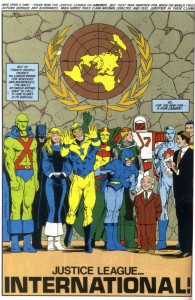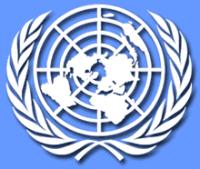Interpol and U.N. Back ‘Global Policing Doctrine’
October 13th, 2009I was thinking, “Wow, this seems very familiar. Where have I seen something like this before?” HAHA. This is just too much.
Start em’ young with Justice League International:
The text says:
Once upon a time—There was the Justice League of America. But that was another era, when the world could afford borders and boundaries, when heros could claim national loyalties and feel justified in their claims.
But in today’s world there’s no longer room for borders and boundaries. The walls between nations have to fall if our planet is to survive.
So, for a new era—A new League:
Justice League…
International!
In case you don’t recognize the logo on the wall, here’s the real one:
The Justice League International comic books were published in the 1980s and 1990s.
Via: New York Times:
Interpol and the United Nations are poised to become partners in fighting crime by jointly grooming a global police force that would be deployed as peacekeepers among rogue nations riven by war and organized crime, officials from both organizations say.
On Monday, justice and foreign ministers from more than 60 countries, including the United States and China, are gathering in Singapore for a meeting hosted by the two international organizations.
It is the first step toward creating what Interpol calls a “global policing doctrine” that would enable Interpol and the United Nations to improve the skills of police peacekeepers, largely by sharing a secure communications network and a vast electronic trove of criminal information, including DNA records, fingerprints, photographs and fugitive notices.
“We have a visionary model,” said Ronald K. Noble, secretary general of Interpol and the first American to head the international police organization, which is based in Lyon. More than 187 member nations finance the organization.
“The police will be trained and equipped differently with resources,” Mr. Noble said. “When they stop someone, they will be consulting global databases to determine who they are stopping.”
Modern peacekeeping has evolved dramatically since the blue-helmeted U.N. military force won a Nobel Peace Prize in 1988. Since 2005, the number of police officers within the total force of 95,400 peacekeepers has more than doubled from about 6,000 to 12,200 in 17 countries.
U.N. police are already battling kidnappings and drug crime in Haiti and illicit lumber trading in Liberia. The aim of the joint effort is to increase the ability to track the movement of criminals around the world by sharing resources and common standards, according to Mr. Noble. He is also pressing ahead with plans for special electronic passports for the agency’s staff of more than 600 Interpol investigators to speed border crossings.
The Norwegian Ministry of Foreign Affairs is contributing more than $2 million to finance the development of international global policing standards, according to Andrew Hughes, an Australian who currently heads the U.N.’s force of police officers.
The ambition is to create a series of networks to counter borderless organized criminal operations, Mr. Hughes said. Women, in particular, are being recruited, with a goal of reaching 20 percent of the U.N. force and the development of all-female units like the group of 140 peacekeepers from Bangladesh that is about to be deployed.
“We’re working with refugees,” Mr. Hughes said. “Many of the victims of atrocities are women, and they’ve had enough of men with guns and uniforms.”
He said that among the most critical tasks for a global police force were combating illegal arms and drug trafficking. His own officers in West Africa have watched the growth of cocaine smuggling by Colombian and Venezuelan drug cartels through weakened countries like Sierra Leone and Liberia to the lucrative consumer markets in Europe.
The United States remains the biggest market for cocaine, according to the U.N.’s annual report on drugs and crime. But in the past three years, South American cartels have moved more drugs to Europe using transit points like Guinea Bissau, where the president and the head of the military were killed in sophisticated bombing attacks in March. Each year, at least 50 tons of cocaine from Andean countries passes through West Africa to the streets of Europe, where the drugs are worth almost $2 billion, according to the U.N. report.
“Organized crime is a business that looks for opportunity to expand their market enterprise,” Mr. Hughes said. “When you have a breakdown in police and courts and corrections, organized crime is ripe. We also see the toxic effect of corruption, because they are able to corrupt officials, which makes it difficult to build a functioning society.”
In Afghanistan, where heroin and hashish trafficking is also a thorny issue, NATO announced plans this month to start training the local police — a move it has avoided in the past to concentrate on military responsibilities.
But Mr. Noble of Interpol says he takes a dim view of transforming warriors into beat cops, because the mind-sets are so different.
“We caution on making the delegation of civil police development tasks to military structures,” Mr. Noble said, citing the example of an attack that freed hundreds of Taliban from a prison in Kandahar, Afghanistan, last year. Although Interpol immediately asked for information about the missing prisoners, he said, “we were really shocked and dismayed to learn there were no fingerprints and photographs despite billions spent to train police there.”
With the meeting of justice ministers on Monday, which coincides with a general assembly of Interpol police members, the group is expected to debate the global police issue and to craft a declaration that would lead to an action plan for international police peacekeeping within 12 months.



http://www.jordanmaxwell.com/articles/pictures/pictures9.html
“We’re all Palestinians now….”
Some times I wonder where one story leaves off and another starts. Between the privatization of police and military functions -and the militarization of police (or should I put it the other way around?), I get lost. NYPD has how many in it’s anti-terrorism squad now? 1,000 plus? Working where abroad? And I would wonder why those functions aren’t left to Homeland Security, but I digress… This story speaks of overt organized crime after all.
Okay, the most recent Cryptogon story, volunteer Army quotas finally met comes to mind. How many from here, Oklahoma, I wonder. As far as I know, we’ve had a disproportionate amount of Oklahomans enlist for Iraq -or at least sent back in body bags. Well, where does Oklahoma fit into the international policing biz then I wonder.
Poverty is a very central node of the economy here in Oklahoma City. Dollar stores, Pawn shops, payday loan shops, thrift stores, church pantries, government housing, licensed panhandling, crass megachurches, this is OKC. Football and the military are huge here. But basically, driving around, it seems the central economical theme is poverty. I noticed this 9 years ago, not a recent development at all. (What *is* new is the resurgence of the KKK here, as far as new goes. It’s another story to look into skinhead activity in the military being ignored, virtually winked at.)
Locally, the closest thing to global policing we may be interested in, outside of putting ‘boots on the ground’ worldwide, must be the interweb, if the local Infragard chapter’s links page is any lead. And it’s a short list. I guess it makes sense -it’s the only ‘infrastructure’ that’s not exclusively local… But it’s a damned interesting list. (Supposedly Infragard members are virtually licensed to kill, which is the only thing about them that ever really made me sit up.) But it’s a list of sites unlike I’ve ever seen before. I don’t doubt such ‘spam and virus watch’ sites are way old news, but they were to me.
And I got to wondering when and where Northcom and Cyber Command might intersect…. Maybe back on the front page, where Infragardok lists it’s monthly meetings? So maybe I might wonder at the FBI’s relationship with Northcom… Googling it up, aside from a detour or two, I’m led back here.
https://cryptogon.com/?p=8310
Some times I wonder where one story leaves off and another starts.
Fusion centers and OKC; infragardok powerpoint piece
my overtired mind boggles
http://axiomamuse.wordpress.com/tag/sb-483/page/2/
http://axiomamuse.wordpress.com/category/oklahoma-politics/page/2/
too much for me for now, bed calls
more than i can digest here but the picture grows obscure from all the blackness of it all
want out of this town but my wife’s fam is here and where the hell is there to go anyway
(hawaii would be nice, koff)
just dropping off these links, kevin, no need to post em and i’m too locally fixated for the global nature of your post’s topic here i think
ni ni,
z